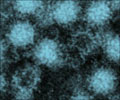An experimental vaccine manufactured by LigoCyte Pharmaceuticals, Inc. provided significant protection against norovirus infection

"This is the first demonstration of protection in humans against what is a widespread and often serious illness and is a big development for the field," said Robert Atmar, M.D., of Baylor College of Medicine and the study's principal investigator. "The number of hospitalizations and the healthcare costs associated with norovirus are staggering; a successful vaccine against norovirus would offer significant protection to patients as well as potential cost reductions for the healthcare system."
"The positive results from this rigorous challenge study demonstrate that norovirus gastroenteritis, which can result in severe illness in many people, can be prevented by vaccination," said Donald P. Beeman, LigoCyte's Chief Executive Officer. "Development of our bivalent intramuscular vaccine is currently underway, and we look forward to the results of upcoming clinical studies of the product."
Specifically, data from the study show:
- In the 77 adults who completed the trial per its original protocol, vaccination decreased the incidence of gastroenteritis due to norovirus from 69.2 percent to 36.8 percent, a 47 percent reduction in illness compared to subjects receiving placebo (95% CI 15.2%-66.6%; p=.006).
- Subjects receiving vaccine scored lower on a severity of illness scale (p=.011).
- Immunization with the VLP vaccine increased antibody titers that blocked VLP binding to histo blood group antigens in vitro. Advertisement
- Higher functional antibody responses in all subjects correlated with increased protection against illness. A serum BT50 titer of 200 or greater was associated with a 72.2 percent reduction in virus-associated illness (odds ratio of 8.1 (95% CI 2.1-31.2)).
- Adverse events occurred with similar frequency among vaccine and placebo subjects. The most common symptoms after vaccination included nasal congestion, stuffiness and sneezing. Advertisement
Norovirus gastroenteritis is a widespread and potentially severe illness characterized by the acute onset of nausea, vomiting, abdominal cramps, diarrhea and occasionally fever. Noroviruses are highly infective and easily transmitted from person to person or via contaminated environments. Epidemic outbreaks occur in community environments, particularly hospitals, hotels, schools, day care facilities and nursing homes, with mounting socioeconomic cost to families, the health care system and businesses. Military units are significantly affected when the virus strikes, as outbreaks impact combat readiness. Severe clinical outcomes are reported in older adults, children and immunocompromised individuals in whom infection can lead to substantial complications and can even lead to death.
About the Phase I/II Norovirus Vaccine and Challenge Study
The Phase I/II randomized, double blind, multi-center, placebo-controlled safety and efficacy study was designed to evaluate the norovirus monovalent GI.1 VLP vaccine versus placebo in approximately 90 healthy adult volunteers between the ages of 18 and 50 years. The study consisted of two stages: the vaccination stage with post-vaccination follow-up, followed by the challenge stage, in which subjects were exposed to the live virus, with post-challenge follow-up. Subjects received a two-dose intranasal regimen of either the vaccine or placebo on days 0 and 21 and were evaluated for vaccine safety and immune responses. On or after study day 42, subjects were admitted to an inpatient nursing unit, challenged with live norovirus, held in the unit for at least four days following challenge and then followed for post-challenge safety and efficacy with multiple clinical assessments and collection of stool specimens. The study was conducted at Baylor College of Medicine, the University of Cincinnati and Cincinnati Children's Hospital Medical Center, the Johns Hopkins School of Medicine and SNBL CPC, Inc., a clinical research organization in Baltimore, Md.
About LigoCyte's Intranasal Norovirus Vaccine Candidate
LigoCyte's intranasal norovirus vaccine is a dry powder formulation containing virus-like particle (VLP) antigens representing the live virus while lacking the ability to reproduce or cause illness. VLPs mimic the natural virus by preserving the authentic structure of the viral capsid, the shell of protein that protects the nucleic acid of a virus. LigoCyte's vaccine formulation also includes the adjuvant Monophosphoryl Lipid A, provided under license from GlaxoSmithKline PLC (NYSE: GSK), and the nasal vaccine incorporates chitosan. This application of chitosan (ChiSys®) has been licensed from Archimedes Development Ltd.(1)A clinical study of an intramuscular bivalent formulation of LigoCyte's norovirus vaccine is ongoing. Preliminary results from that study were presented by one of the principal investigators in the study, Sharon Frey, M.D., from the Saint Louis University Center for Vaccine Development at the Saint Louis University School of Medicine, at the Infectious Diseases Society of America (IDSA) 2011 Annual Meeting on October 21 in Boston, Mass. Data presented at the meeting indicate that the intramuscular vaccine induces immune responses that are even more potent than the nasal formulation of the vaccine.
Source-Eurekalert












